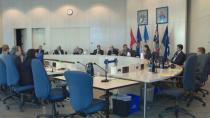Committee sends Edmonton's 500m booze rule for review
An Edmonton rule requiring liquor stores to be at least 500 metres apart may be a thing of the past after city councillors get a review of the bylaw in June.
The city's urban planning committee instructed administration Tuesday to explore options that may relax the distance required between stores, and also re-evaluate store hours and who should be eligible to get a business liquor license.
The discussion was spurred in December when Stantec Consulting asked the city to exempt the arena and entertainment district, owned by the Katz Group, from the bylaw.
Coun. Michael Walters, who chairs the committee, insists the review isn't in direct response to the Katz Group request.
"It's not an issue of the particular applicant," Walters told CBC News.
He said councillors agreed to explore population density to help determine if the number of liquor stores is appropriate.
"Not every neighbourhood in Edmonton is the same," he said. "Some neighbourhoods may need more liquor stores than other neighbourhoods just because there's more people."
A city report shows approximately 13,000 residents now live downtown, with a targeted population increase to 24,000 by 2030.
Small business owners and advocates attended the committee meeting to express concerns that big business may get an unfair advantage.
Dirk Chan, a partner at deVine Wines and Spirits on 104th Street, urged councillors to keep the bylaw the way it is.
"Thirteen years ago we built our entire business, our business plans ... based on those rules," Chan said. "I think it's wrong to change them midstream."
Seven liquor stores are within the half-kilometre range of the arena and entertainment district, which stretches from 105th Avenue to 103rd Avenue and from 101st Street to 104th Street.
Arena Liquor on 103rd Street is within 20 metres of the district and Unwined in the City Centre Mall is 170 metres away.
Coun. Scott McKeen wants the free market to determine which stores succeed.
"Greater competition will actually elbow out some of the lowest-common-denominator operators out there," he said.
McKeen questioned whether density of liquor stores actually leads to social disorder and whether the main reason for the bylaw is to curb public intoxication at all.
"If you had a wine store next to a beer store next to a single malt scotch store on a cool funky street, whether that would add up to social disorder," McKeen said to the committee.
"Seems to me we have a really complex social issue that we're trying to solve here with zoning."
Ivonne Martinez, president of the Alberta Liquor Store Association, took issue with the Katz Group going directly to council to ask for an exemption.
"We feel that if everyone plays by the same rules, whether you're a little guy or a big guy, then everything should be according to plan," Martinez said.
Martinez said the association's main concern is social responsibility and making sure density doesn't drive more intoxication.
"Those are issues that when you have three or four liquor stores clustered together, they [street drinkers] tend to come and hang out right outside there," she said.
McKeen is hoping administration will consult other cities, local liquor store operators and the police to come up with a "sophisticated strategy," which he said the 500-metre rule is not.
Councillors want to focus on the downtown area with the bylaw review but the review will be citywide.
City administration is scheduled to return to the urban planning committee June 19 with options for the bylaw.










